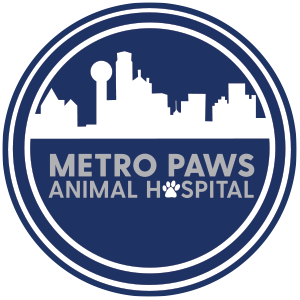David Deresz, DVM
Itchy dogs and cats are some of our most common patient complaints. This is noticed as scratching, licking, or biting. While there are many potential causes of this problem, only a few are responsible for the vast majority of cases. These common triggers can be broken down into 4 main groups; parasites, environmental allergies, food allergies, and infection.
Parasites are one of the most common reasons for itching, which can include fleas and mites. In this area of Dallas, flea prevention is a must for outdoor venturing pets. We have a healthy feral cat and urban wildlife population, many of which carry fleas. However, flea preventatives are not repellants (i.e. they require the flea to be on the pet to work) so in areas where urban animals frequent, the environment may need to be treated to keep you from seeing fleas on your pet. These products do limit the amount of time a flea spends on the animal and helps to prevent an infestation from happening in your house.
Certain types of mites are responsible for mange. This is not seen often, but the two types of mange in dogs are demodectic mange (young dog mange) and sarcoptic mange (infectious mange). Both of these can be treated effectively.
In cats, fleas are also a prevalent issue. Symptoms seen are usually similar to those in dogs. Cats are also susceptible to fly bite dermatitis, which happens primarily in cats who venture outdoors. Their body overreacts to biting flies and mosquitos, causing wounds on the nose and ears.
Environment allergies are another one of the most common reasons for itching. Dogs and cats develop these hypersensivities to pollens, weeds, dust, and human dander as they are exposed to these allergens over time. While humans primarily develop respiratory sensitivity, dogs and cats often develop skin reactivity which manifests itself as itch. Environmental allergies can develop in pets less than one year of age, and even in older, senior pets. This is a manageable disease, but it cannot be cured. A multimodal therapy approach is used to try and use as little medication as possible to control the itch.
Food allergies can cause itching as well. Most commonly, the pet becomes hypersensitive to animal proteins in their diet. Other less common allergens are plant protein, such as wheat or soy. When the immune system notices these being absorbed, a reaction happens that leads to itchy skin. These symptoms may be seen with or without gastrointestinal problems, such as diarrhea or vomiting. Treatment for this involves a hydrolyzed or novel protein diet. Prescription diets achieve this best, since these diets are guaranteed to contain only the ingredients listed. Response is gauged over eight to twelve weeks. No treats or other foods should be given during this time to maintain integrity of the food trial.
Infection is the last common reason for itching. Dogs can get primary skin infections, meaning there is no underlying cause. However, most cases of infection arise secondarily to one of the previously mentioned conditions. Infectious agents include bacteria, yeast, and less commonly fungi. Skin cytology or additional testing may be needed to differentiate between these. Oral antibiotics and/or antifungals will likely be sent home. Sometimes topical medications, such as shampoos or mousse, will be used to treat or prevent infections in patients with chronic issues.
Treatments for any of the above conditions are aimed at two things: keeping your pet more comfortable at home and limiting the number of visits needed to treat infections. If your pet has problems with itching, please make an appointment so we can help!
